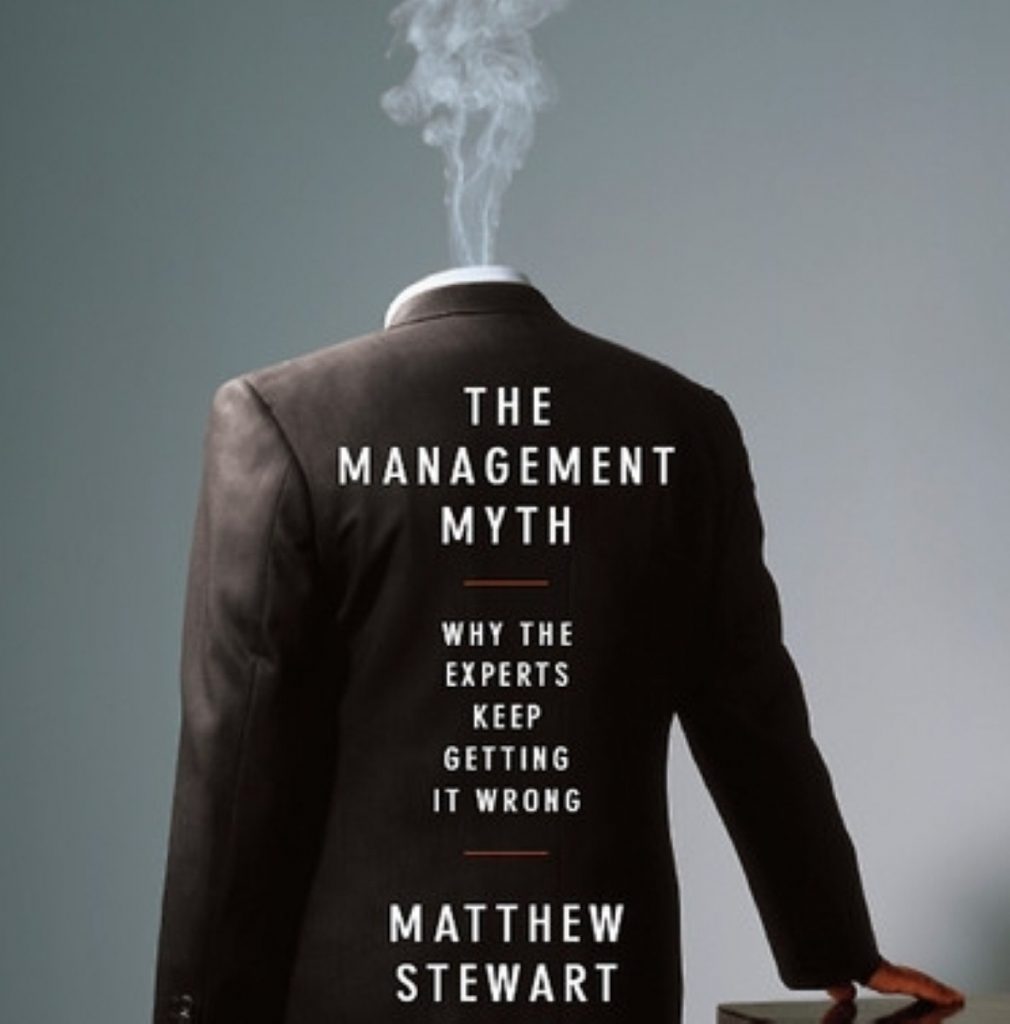Review: The Management Myth
The Management Myth: Why the Experts Keep Getting it Wrong – Matthew Stewart
Norton
Review by Jonathan Moore
Cuts. It’s the buzzword that’s going to define the next economic cycle in British politics and possibly for many years beyond.
Politicians are falling over themselves to tell us how hard, how fast and how deep they will cut public spending in order to rein-in the spiralling Budget deficit. Well, the Tories gleefully tell us how hard and fast they can scythe public expenditure while the others make dour commitments about prudence and controlled fiscal investment.
Whichever way you look at it, there is a going to be a substantial and sustained reduction in spending, yet everyone is trying to convince us they can deliver this necessary decrease without affecting frontline services. And how is it they hope to achieve this minor monetary miracle? Why, through efficiency savings of course.
To those unfamiliar with management-speak that means working smarter rather than harder and finding better ways to complete tasks. To those who have come across consultants before they will recognise it as a tacit admission that the current system is poorly run, bloated, bogged down in bureaucracy and could easily lose half its staff with no tangible effect to the service provided.
This magical world of efficiency savings through consultants is the central topic of Matthew Stewart’s book, ‘The Management Myth: Why the experts keep getting it wrong’. Stewart, a former management consultant himself, attempts to show, through a potted history of his own experiences in the field, intertwined with a history of the development of the discipline, just how crazy and baffling a world it really is.
For those who have had experience dealing with them, the mere mention of consultants will conjure the image of insipid, economic parasites whose sole apparent purpose of existence is to bleed companies dry while implementing large-scale redundancies. What will shock those people while reading this book is that consultants not only know this is what they are, but appear to revel in the fact they are pulling off such a con.
For those who have not yet had the particular enjoyment of working with those who ‘think outside the box’, they may have some difficulty accepting this book as a work of non-fiction – so outlandish is the premise that were you to suggest it in a novel it would be laughed off as ridiculous. That these people earn more than the average person could ever dream of will only compound the confusion.
Stewart succinctly sums up the mystery of the discipline when recalling a conversation with Bruce Henderson, founder of the Boston Consulting Group, one of the best-regarded firms in the world:
“Henderson later described consulting as ‘the most improbable business on earth’: ‘Can you think of anything less improbable [sic] than taking the world’s most successful firms, leaders in their businesses, and hiring people just fresh out of school and telling them how to run their businesses and they are willing to pay millions of dollars for this advice?’ Even more improbable, one would have thought, is that a dozen men with no obvious claim to fame should, one fine Saturday morning, declare themselves experts in a subject whose contents they themselves would get to define, and then turn around and expect the whole world to pay for such expertise. And yet, against all odds, the world proved eager to buy.”
The book itself is an interesting, if sometimes dry, analysis of a topic the majority of us will have very little understanding of. The use of a dual timeline, mixing chapters dealing with Stewart’s own rise in the industry with those documenting consultancy’s attempts to legitimise itself through its formative years by incorporating semblances of science and academia.
While the content provides a devastating and scathing indictment of the world of consulting, it sometimes seems as if Stewart is less inclined to pass judgement than the facts he presents demand. Undoubtedly, having worked in the industry and spent a portion of his life consumed by the world, he retains some appreciation for the work.
Fortunately for the rest of us, this nostalgia doesn’t prevent him from painting a picture which is genuinely shocking. The sheer audacity of the industry is breathtaking, that it has lasted as long as it has is confounding and that it is worth so much money remains absolutely dumbfounding.
One of Stewart’s former professors from his life before consulting asks a question which needs to be asked by everyone: “How can so many who know so little make so much by telling other people how to do the jobs they are paid to know how to do?”
In this climate of austerity and the need for public sector cuts, when so many are worried about the possibility that nurses, teachers and other such essential workers will be forced out of work as government tightens its belt, it is worth noting that £2.8 billion of taxpayers’ money was spent on consultancy fees in 2005-06 alone.
If you want a definition of a bloated government pouring public money away, read The Management Myth and form your own opinion as to whether it’s money well spent.





-01.png)